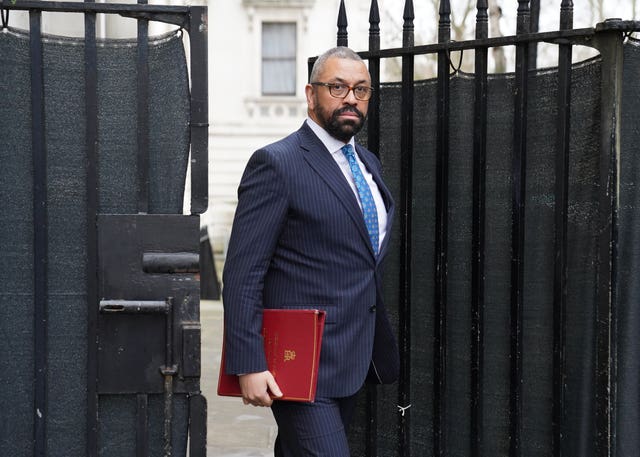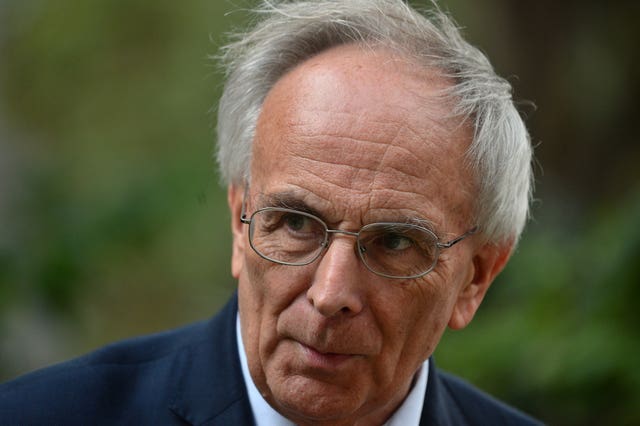Both Boris Johnson and Liz Truss are to vote against Rishi Sunak’s Brexit deal in Parliament, as the Prime Minister faced a growing Commons rebellion.
The two former prime ministers will form part of an expected backbench rebellion against the agreement negotiated with Brussels, although the full extent of Tory opposition remains unclear.
Mr Johnson confirmed on Wednesday that he will not be backing the deal when MPs vote on the Stormont brake in the Commons later on Wednesday, with Ms Truss set to follow suit.
In a statement, Mr Johnson said: “The proposed arrangements would mean either that Northern Ireland remained captured by the EU legal order – and was increasingly divergent from the rest of the UK – or they would mean that the whole of the UK was unable properly to diverge and take advantage of Brexit.
“That is not acceptable. I will be voting against the proposed arrangements today.
“Instead, the best course of action is to proceed with the Northern Ireland Protocol Bill, and make sure that we take back control.”
A source close to Ms Truss said she also plans to vote against it.
Ms Truss is understood to believe the Prime Minister’s Windsor pact does not “satisfactorily resolve the issues thrown up by” the Northern Ireland Protocol and “almost fatally impinges” on the UK’s ability to diverge from EU rules and regulations.
But with Labour backing the Windsor Framework agreement signed last month, the Government should win the Commons division comfortably, despite criticism from some hardline Tory Brexiteers.
The DUP has already said its eight MPs will vote against the regulation to implement the Stormont brake as it continues to seek changes to the overall framework.
Other potential rebels include former home secretary Priti Patel and former Conservative Party leader Sir Iain Duncan Smith.
The confirmation by Mr Johnson of his opposition to the UK-EU deal comes ahead of his appearance before the Privileges Committee, where he will be grilled by MPs investigating claims that he knowingly misled Parliament over the partygate affair.
The former prime minister, who agreed the original Northern Ireland Protocol with Brussels as a way to avoid a hard border on the island of Ireland, had earlier this month indicated that he would find it “very difficult” to support the Windsor agreement.

In a show of blue-on-blue Tory infighting over Wednesday’s vote, Northern Ireland minister Steve Baker warned Mr Johnson he risks “looking like a pound-shop Nigel Farage” – a reference to the former leader of pro-Brexit party Ukip – if he votes against Mr Sunak’s protocol revisions.
On Tuesday, the European Research Group (ERG) said the brake, which is intended to provide a veto on the imposition of new EU regulations in Northern Ireland, is “practically useless” following an analysis of the framework by its “star chamber” of lawyers.
Chairman Mark Francois and his deputy David Jones have both confirmed that that they will join rebels in voting against the Government, with the Eurosceptic group set to meet later to discuss its position.
“If they do have to rely upon Labour votes, then that’s a very, very strong signal that the Conservative Party in Parliament is unhappy with this proposal,” he told BBC Radio Ulster.

Foreign Secretary James Cleverly is due to meet the EU’s Maros Sefcovic in London on Friday to formally adopt the Windsor pact at a meeting of the joint committee on the Withdrawal Agreement.
A Government source said this is “the best deal for Northern Ireland which ensures the smooth flow of internal UK trade, safeguards NI’s place in the Union and addresses the democratic deficit”.
“In negotiations the PM secured significant concessions, with this deal going well beyond what had been on the table before. It goes much further than the Northern Ireland Protocol Bill and fixes the problems with the old protocol.
“Without the Windsor Framework, the legal default in domestic and international law is automatic alignment to EU standards and rules with no say in Northern Ireland.”
While the DUP is not in a position to block it, their opposition suggests that an early return to powersharing at Stormont is highly unlikely.
The Executive and Assembly have been suspended since the DUP walked out last year in protest at the way the protocol was operating, saying it weakened Northern Ireland’s position in the UK.
Downing Street has indicated that there could be further votes in the weeks ahead on the statutory instruments needed to implement other elements of the framework.

However, there is frustration among some MPs that Mr Sunak is resisting calls for an overall vote on the whole framework document.
Conservative backbencher Peter Bone said he is “pretty miffed” about the Government’s approach to a vote as he signalled that he could join Mr Johnson in voting against this part of the deal.
“I’m really pretty miffed that the Government is avoiding scrutiny on this, and on the brake itself, it seems to fail all the tests,” Mr Bone, who was deputy leader of the House for three months last year, told Sky News.
“If that is the case, I’m going to listen to the debate. I’m going to go meetings this morning, but, if I had to vote at this moment in time, I should vote against.”
Johnson loyalist Andrea Jenkyns also confirmed she will be voting against the deal, tweeting that it is a “capitulation to the EU”.




Comments: Our rules
We want our comments to be a lively and valuable part of our community - a place where readers can debate and engage with the most important local issues. The ability to comment on our stories is a privilege, not a right, however, and that privilege may be withdrawn if it is abused or misused.
Please report any comments that break our rules.
Read the rules hereLast Updated:
Report this comment Cancel